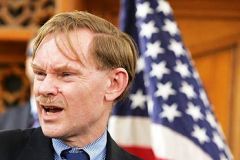US wants more police to protect Darfur refugees
By Opheera McDoom
KUTUM, Sudan, June 3 (Reuters) – The United States called on Friday for more African Union police in camps housing 2 million displaced people in Darfur, saying it would help stop attacks on civilians in the Sudanese region.

|
|
US Deputy Secretary of State, Robert Zoellick. |
Visiting Darfur for a second time since April, U.S. Deputy Secretary of State Robert Zoellick also urged the Sudanese government to disarm Arab militias accused of rape, burning and killing.
“We are certainly sending a very strong message to the government of Sudan that we want them to stop the militias … and we also want them to move to disarm the militias,” he said in El-Fasher, one of Darfur’s main cities.
He was speaking to reporters after talks at the regional headquarters of the 53-nation African Union in Darfur, where more than half the population is going hungry and AU troops are struggling to keep the peace.
“The message we have is that where we have AU forces conflict doesn’t occur … and that’s one reason why a key element of the strategy is to expand the AU force presence,” Zoellick said.
Zoellick, who has made Sudan a priority, later walked through one of Darfur’s camps for displaced people and met tribal leaders who told him they wanted more police and AU forces to protect their people.
The AU has about 3,000 troops and police on the ground, but experts say the force is far too small to patrol an area that is the size of France.
The AU hopes to expand the number to 7,000 by September, winning donor pledges of nearly $300 million last month, including $50 million from the United States.
Zoellick said deploying AU police in the refugee camps would be key to reducing attacks and returning security to Darfur, suffering the effects of a rebellion into its third year.
“The key is to get the police forces operating within the camps and so that is being expanded and we talked about 30 additional posts in the camps,” he said after talks with visiting AU Peace and Security Commissioner Said Djinnit.
AU police have a permanent presence in just one camp at the moment, in Kalma camp in South Darfur. It is the largest in the region with 110,000 displaced people.
POLICE DETER ATTACKS
South African police commissioner Annan Pillay, who is in charge of the almost 500 AU police currently in Darfur, said police patrols had already reduced the numbers of reported rapes and attacks on camp residents.
He confirmed the creation of 30 additional posts and said they would be deployed in priority camps later this month.
About 180,000 people have died in Darfur through violence, hunger and disease since rebels took up arms against the Arab-dominated government in February 2003. More than 2 million have been forced to flee their homes and are staying in camps.
The rebels have accused the authorities of arming the militias but the government denies this.
Efforts to solve the crisis peacefully have been stalled for the past six months, but AU-mediated talks between the rebels and Khartoum are expected to resume by June 10 in Nigeria.
“It’s not enough to provide humanitarian support and food and security here — we need to press forward the peaceful reconciliation process,” Zoellick said.
He later visited Kutum town in northern Darfur and walked through a refugee camp which houses about 20,000 people. Children chanting “Welcome, welcome” crowded around him.
He assured them more AU forces would be coming. People in Kutum said the security situation has improved since the AU established a base there three months ago.
Mohidin Adam said he and other residents had not been able to move far from the camp for fear of being attacked. “But in the last few months, the security has generally improved because of the presence of the African Union.”
One local leader told Zoellick the roads were still not safe enough for the displaced to return to their homes. “We will only go home when we are accompanied by international or American troops,” tribal leader Adam Ahmed Ajain said.
